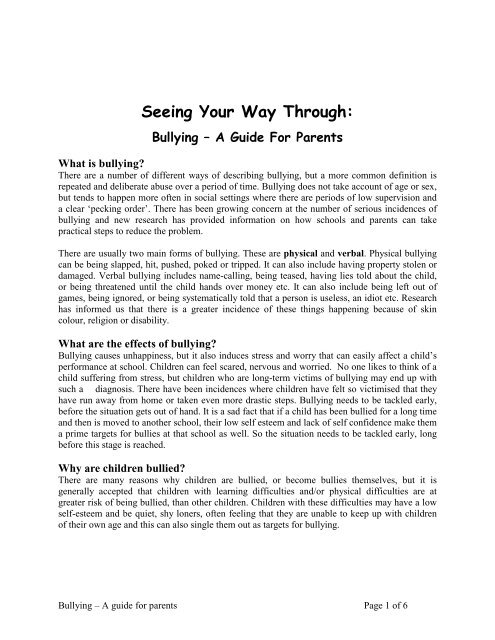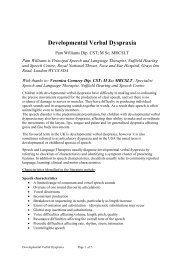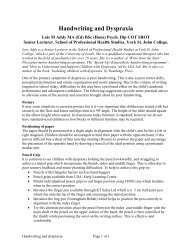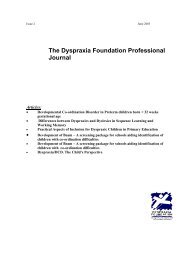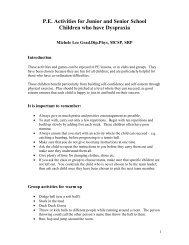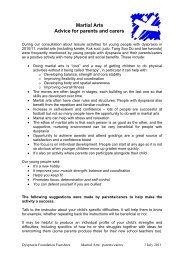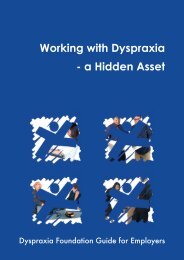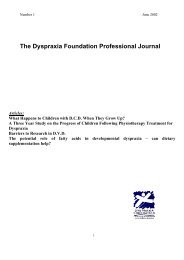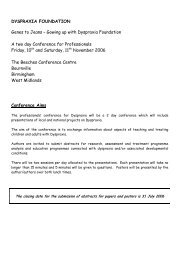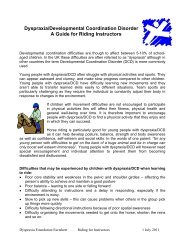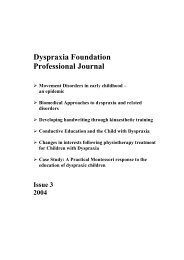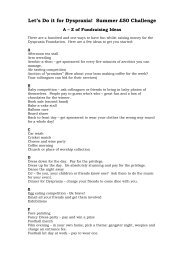Seeing Your Way Through: - Dyspraxia Foundation
Seeing Your Way Through: - Dyspraxia Foundation
Seeing Your Way Through: - Dyspraxia Foundation
Create successful ePaper yourself
Turn your PDF publications into a flip-book with our unique Google optimized e-Paper software.
<strong>Seeing</strong> <strong>Your</strong> <strong>Way</strong> <strong>Through</strong>:<br />
Bullying – A Guide For Parents<br />
What is bullying<br />
There are a number of different ways of describing bullying, but a more common definition is<br />
repeated and deliberate abuse over a period of time. Bullying does not take account of age or sex,<br />
but tends to happen more often in social settings where there are periods of low supervision and<br />
a clear ‘pecking order’. There has been growing concern at the number of serious incidences of<br />
bullying and new research has provided information on how schools and parents can take<br />
practical steps to reduce the problem.<br />
There are usually two main forms of bullying. These are physical and verbal. Physical bullying<br />
can be being slapped, hit, pushed, poked or tripped. It can also include having property stolen or<br />
damaged. Verbal bullying includes name-calling, being teased, having lies told about the child,<br />
or being threatened until the child hands over money etc. It can also include being left out of<br />
games, being ignored, or being systematically told that a person is useless, an idiot etc. Research<br />
has informed us that there is a greater incidence of these things happening because of skin<br />
colour, religion or disability.<br />
What are the effects of bullying<br />
Bullying causes unhappiness, but it also induces stress and worry that can easily affect a child’s<br />
performance at school. Children can feel scared, nervous and worried. No one likes to think of a<br />
child suffering from stress, but children who are long-term victims of bullying may end up with<br />
such a diagnosis. There have been incidences where children have felt so victimised that they<br />
have run away from home or taken even more drastic steps. Bullying needs to be tackled early,<br />
before the situation gets out of hand. It is a sad fact that if a child has been bullied for a long time<br />
and then is moved to another school, their low self esteem and lack of self confidence make them<br />
a prime targets for bullies at that school as well. So the situation needs to be tackled early, long<br />
before this stage is reached.<br />
Why are children bullied<br />
There are many reasons why children are bullied, or become bullies themselves, but it is<br />
generally accepted that children with learning difficulties and/or physical difficulties are at<br />
greater risk of being bullied, than other children. Children with these difficulties may have a low<br />
self-esteem and be quiet, shy loners, often feeling that they are unable to keep up with children<br />
of their own age and this can also single them out as targets for bullying.<br />
Bullying – A guide for parents Page 1 of 6
Is your child being bullied<br />
Children often find it difficult to talk about being bullied. Many bullies threaten children not to<br />
tell and the embarrassment of the whole school knowing can also influence their decision to keep<br />
quiet. As Valerie Besag, one of the UK’s leading authorities on bullying writes, “Given that<br />
many bullied children find it difficult to approach their parents for help, the optimum situation<br />
must be that all parents are alerted to the possibility of bullying occurring, be made aware of the<br />
warning signs and be encouraged to approach the school should they suspect anything<br />
untoward.”<br />
Sometimes sudden behaviour changes may indicate that a child is being bullied. Some of these<br />
are detailed below, but these are not definite indicators. Please bear in mind that there may be<br />
other causes:<br />
• Behaviour problems. The child may become quiet and withdrawn, spending most of their<br />
time playing computer games or watching television. They may no longer wish to take part<br />
in social activities and may resent any small criticism. A request to tidy their room may<br />
result in floods of tears and “you’re always picking on me, never anyone else!” Sometimes<br />
they may take their angry feelings out on their siblings or friends. They may pick fights,<br />
stop sharing or overreact to normal situations. They may be forced to steal by bullies who<br />
threaten them with violence if they don’t regularly give them money, or they may<br />
desperately want to be accepted so they join a gang that won’t<br />
accept them unless they<br />
steal or break the law in some other way.<br />
• School problems. Children sometimes refuse to go to school or will develop tummy or<br />
headaches rather than go to school or attend particular lessons. They may be so worried<br />
about the bullying that they can’t concentrate on school and homework. Their books may<br />
be damaged or lost or their money may go missing. They may offer the bully presents to<br />
leave them alone and say they lost them.<br />
• Night problems. They may have nightmares and may shout out in their sleep things like<br />
“No, leave me alone”. They may begin wetting the bed, possibly indicating that they are<br />
worried about something. Disturbed sleep patterns will mean the child is tired in the<br />
mornings and this makes getting them to school even more difficult.<br />
• Injuries. Physical bullying may leave bruises, the child may try to explain them, but it may<br />
be useful to check if the school are aware of any incidents. Frequent bruising should<br />
always be queried.<br />
• Low self-esteem. Verbal bullying can make a child worry about any aspect of his<br />
appearance. A child called ‘teacher’s pet’ may deliberately fail at school, while another<br />
may become obsessive about washing after being called ‘smelly’. Children can become<br />
dependent and act babyish. They may revert to thumb sucking, biting nails, overeating,<br />
under eating, stammering or chewing things like hair or clothes. They may become tearful,<br />
tired all the time and depressed.<br />
• A child who talks about not wanting to live or suicide should always be taken<br />
seriously and needs urgent help. Forcing them to go to school will only make<br />
the situation worse.<br />
Bullying – A guide for parents Page 2 of 6
What can you do<br />
It is useful to encourage your child to chat about their day at school and to try to make a special<br />
time to talk. Ask about their friends, who they played with that day or what they did. If they<br />
don’t want to talk, do not make them. This will only be another situation in which they feel<br />
pressurised. It can also be a mistake to come straight out and ask, “Are you being bullied” They<br />
may become defensive and deny everything.<br />
Sometimes, telling stories about bullying that happened when you were young shows you<br />
understand and may encourage your child to confide in you. You could ask other parents if their<br />
children have mentioned anything, but be careful, that they don’t realise what is going on.<br />
Sometimes you could arrive earlier to pick them up from school and watch what happens, or you<br />
could walk past the school at a break time and look in the playground to see what is happening,<br />
making sure they do not see you.<br />
If you are sure that there is a bullying problem, then there are measures you and your child can<br />
take:<br />
• Tell the school straight away. If your child is worried about this, then you may have to<br />
ask the teacher not to say anything. Most teachers are aware of this and usually co-operate,<br />
but if you feel that the school are not taking your concerns seriously, then you may have to<br />
contact the Board of Governors for further support.<br />
• Be very supportive towards your child. Do not tell them to pull themselves together, to<br />
stand up for themselves, or to hit back. Make sure they know that they can talk to you any<br />
time.<br />
• Encourage them to act confidently, standing tall and erect. They will look less like an<br />
easy victim. Practicing in a mirror will help.<br />
• Remind them to try to stay with a friend or group of friends. Get them to practice what<br />
they will do in certain circumstances. If they have practiced a routine plan of action, they<br />
will feel more in control.<br />
• Name calling or teasing can be laughed off or ignored. Walking away or acting not<br />
bothered may be enough to stop the name calling, because it becomes boring without a<br />
reaction. Practice this together.<br />
• If the child is threatened, cornered, or grabbed, they should:<br />
(a) Walk away, looking straight ahead, towards a group of friends or a teacher or someone<br />
else who can help.<br />
(b) If the bullies try to stop them, shout “NO! GO AWAY!” Then walk away quickly.<br />
(c) If threatened by a gang, look the weakest one in the eye and say, “THIS ISN’T<br />
FUNNY!” and walk away.<br />
(d) Report the incident to a teacher or other adult straight away.<br />
• Being hit, kicked or pushed is more difficult to deal with. If it is one slap or kick, then they<br />
can act as before and tell someone as soon as possible. If they are beaten up, they should<br />
protect themselves as much as possible until it stops.<br />
Bullying – A guide for parents Page 3 of 6
• They could try to make as much noise as possible so someone could hear and get help, this<br />
can be useful as the bullies run the risk of being caught. They could fight back and escape<br />
as quickly as possible and run for help. What they decide to do will probably depend on<br />
what is happening at the time.<br />
• Make sure they are encouraged to tell what has happened as soon as possible.<br />
• Boost their confidence by telling them “You can do this really well“. Credit them for<br />
things they do well, for trying and acknowledge that they have fears. Don’t say, “Stop<br />
being silly” or “Pull yourself together”. They will get their confidence back – but in their<br />
own time.<br />
• Threatening the bully yourself, while occasionally being successful, probably isn’t a good<br />
idea. The bully may just decide to pick on another child for a while. It can also be very<br />
embarrassing for a child if they have to have their parents sort out their problems. A child<br />
with a learning disability may have enough to cope with, without the whole school<br />
knowing that there is yet another thing they are unable to deal with themselves!<br />
• Encourage them to take part in other activities such as drama clubs, youth clubs or sports<br />
groups. Be aware that they may have difficulties that influence the suitability of some<br />
groups. They will not want to be placed in another situation where there is a high<br />
likelihood of failure. It is better to build on something they are interested in and like, such<br />
as drama or first-aid, rather than enrol them in self-defence classes for instance.<br />
What can schools do about bullying<br />
There have been many methods introduced over recent years, both in this country and others, in<br />
an effort to reduce the incidence of bullying in schools. The introduction of school bullying<br />
policies has become more common and many schools will have a policy in place. Any school<br />
should have an established method of dealing with bulling.<br />
Contact your child’s teacher. Ask them to investigate the situation and inform you and the head<br />
teacher of the results of the investigations. Make sure that you have as much information as<br />
possible and write down all the questions you want to ask. It helps if you can keep a diary of the<br />
different events with all the details written down, including any witnesses. You should also keep<br />
a record of your meetings with the school.<br />
Stress to the school that you want the matter taken seriously. Do not accept excuses or attempts<br />
to put the blame onto your child. If you feel it is necessary, ask for increased supervision at<br />
breaks or for a safe place that your child can go to if they feel threatened.<br />
A first step is usually to get both sides of the story. If there have been a lot of incidences of<br />
bullying, it may be that other children have seen things and they will need encouragement to talk<br />
to the teacher about it. If your child knows the names of children who might have seen<br />
something, they should be given to the teacher to investigate further. It is usual to then bring the<br />
parents of the bully and the bullied child separately, into school to discuss the situation. Once<br />
discussions have taken place with all parents, the school should keep everybody informed of the<br />
outcome of the investigation.<br />
Bullying – A guide for parents Page 4 of 6
Once the investigation has been carried out, the school will need to take action against the bullies<br />
and ensure that this does not happen again. Often, a first step is to make the bully apologise to<br />
their victim. This puts the blame fairly upon the bully. This may be done face to face or in a note.<br />
<strong>Your</strong> child may be asked which they would prefer. Sometimes, it may be that the school will<br />
decide on a suitable punishment for the child, such as lines, detention, being put on report, or in<br />
some cases, exclusion. You and your child should be informed what is happening.<br />
Some schools have a "Bullying Box" where children can secretly report any bullying. This often<br />
works well and reinforces the ‘telling to stop’ message. It may a good idea to ask the school if<br />
they have any books in the library on bullying. If they haven’t, suggest that they could purchase<br />
some. Ask the head teacher, if the school can talk about bullying in assemblies and as part of<br />
class work. The pupils could draw pictures, write stories or perform plays for the whole of the<br />
school.<br />
Occasionally, schools establish “bully courts“. This is where a panel of children, with a teacher<br />
as adviser, hear cases of bullying. There are witnesses heard and the full story revealed. The<br />
court reaches a decision about the case and may suggest a punishment for the bully. The bully<br />
can either accept this or appeal to the head teacher for a different punishment. This can be very<br />
effective, but a school using this method needs to have a strong anti-bullying policy, where every<br />
child is made aware of bullying and how it is not tolerated at all! The charity ‘Kidscape’ can<br />
usually help schools establish bully courts.<br />
What if your child is the bully<br />
It can very distressing to find that your child is bullying other children. It may be that you have<br />
visited the school to investigate the situation, only to be told that it is your child that is the bully.<br />
The first thing to do is to try to stay calm. <strong>Your</strong> child will need support to be helped to realise<br />
that what they are doing is wrong. It may help if they are asked to imagine how they would feel<br />
if that was done to them. Try to encourage your child to talk about what made them begin to<br />
bully other children. Do not try to give them ‘a taste of their own medicine’ or to shout at them.<br />
The school will probably hold an investigation and you have a right to be informed of everything<br />
that is happening, including the decisions on apologising to the other child and any punishment<br />
that may be enforced. It may help to consider what has made them start to bully other children.<br />
Has a lack of self-confidence made them need to be the centre of attention or are they getting<br />
bullied themselves<br />
What if the bully is a teacher<br />
There are still some teachers who use threats and humiliation to control their pupils. A teacher<br />
may not like a child and continually call them lazy, stupid etc. If you feel that your child is being<br />
bullied by a teacher then it is probably best to talk to the teacher concerned, but do not accuse<br />
them of bullying. It is probably best to talk to them generally, about your child’s progress. Their<br />
answers may give you an indication of their attitude.<br />
If the situation deteriorates then you will need to bring the matter to the head teacher. A good<br />
school will investigate the matter thoroughly. If the teacher has been bullying children, yours<br />
may not be the only one and more complaints may emerge. This may then encourage the<br />
governors and the education authority to take further action.<br />
Bullying – A guide for parents Page 5 of 6
Useful Contacts<br />
Anti-Bullying Campaign: (ABC) 10 Borough High Street, London, SE1 9QQ<br />
Support group for parents of children being bullied at school. Listening and practical advice<br />
service to parents and children. Factsheet for £1 plus SAE. Tel: 0207 378 1446<br />
Childwatch: 206 Hessle Road, Hull, N. Humberside, HU3 3BE,<br />
Advice on protection, prevention and coping with bullying. Send £1.50 for their child protection<br />
pack or ring for advice. Tel: 01482 25552<br />
Exploring Parenthood: Latimer Education Centre. 194 Freston Road, London, W10 6TT,<br />
Telephone helpline and free leaflets on range of subjects including bullying. Send SAE for<br />
publications list, or contact by telephone. Tel: 0208 960 1678<br />
Kidscape: 152 Buckingham Palace Road, London, SW1W 9TR. A charity devoted to the<br />
protection and safety of children. They have developed a variety of practical, positive<br />
programmes to teach children how to cope with bullying and other dangers. Send a large SAE<br />
for free leaflets and details of books and videos. Tel: 0207 730 3300<br />
Parentline: Support line for parents to ring to discuss any problems they may be having with<br />
their child. Tel: 01702 559900<br />
Youth Access: Magazine Business Centre, 11 Newarke Street, Leicester, LE1 5SS, A young<br />
people’s counselling agency, which will be able to put you in touch with counsellors in your<br />
area. Tel: 01162 558763<br />
References and Further Reading<br />
Elliott, Michele, A practical guide to talking with children. Hodder & Stoughton 1988<br />
Helping your child develop strategies for dealing with potentially dangerous situations.<br />
Elliott, Michele, Willow Street Kids. Deutsch/Pan 1992<br />
Fictional stories about a group of children and how they deal with bullying, strangers etc. For<br />
children aged 7 to 11.<br />
Elliott, Michele, Bullies meet the Willow Street Kids. Deutsch/Pan 1993<br />
Sequel to the Willow Street Kids where they meet and deal with a gang of bullies. For children<br />
aged 7 to 11.<br />
Lawson, Sarah, Helping children cope with bullying. Sheldon Press 1995<br />
Practical advice for parents on bullying.<br />
Markham, Ursula, Helping children cope with stress. Sheldon Press 1990<br />
Practical advice for parents on how to recognise symptoms and how to deal with problems.<br />
<strong>Dyspraxia</strong> <strong>Foundation</strong>, 8 West Alley, Hitchin, Herts SG5 1EG<br />
Tel: 01462 454986 (Helpline) Tel: 01462 455016 (Administration) Fax: 01462 455052<br />
Website: www.dyspraxiafoundation.org.uk<br />
© <strong>Dyspraxia</strong> <strong>Foundation</strong><br />
Bullying – A guide for parents Page 6 of 6


